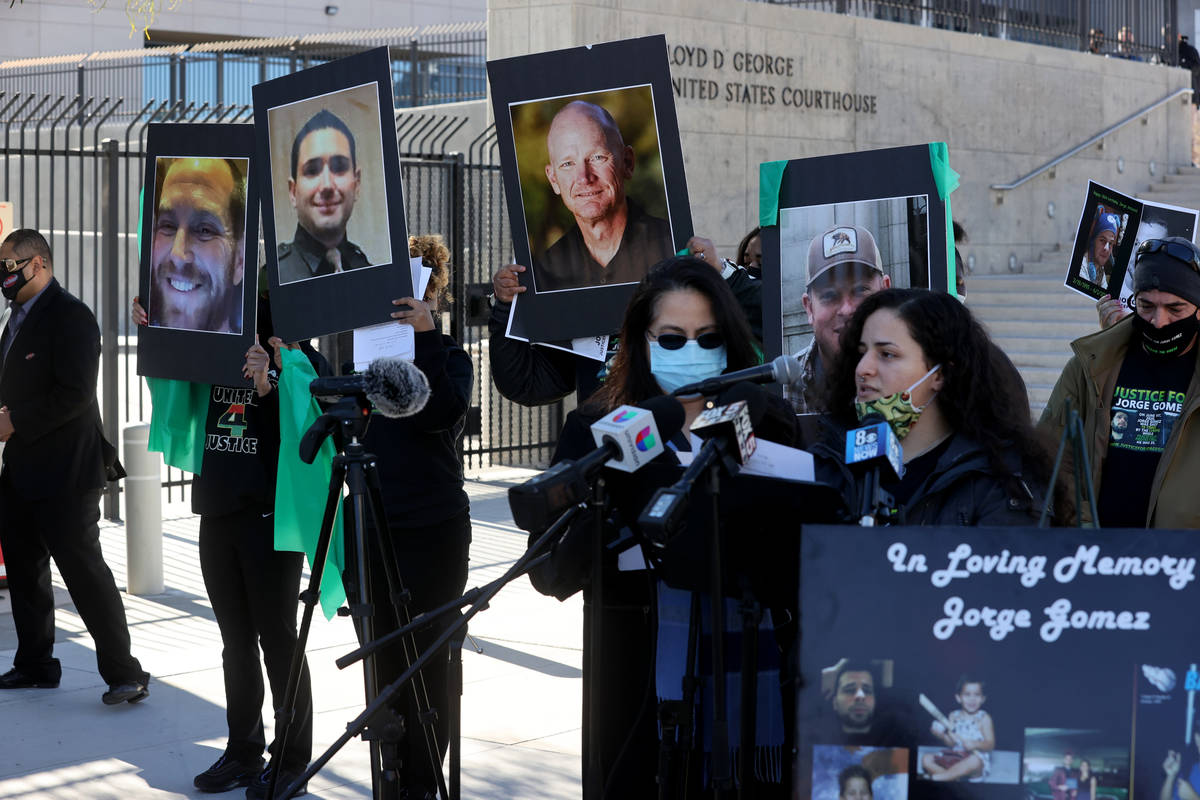Police officer with ties to Jorge Gomez killing no longer with Metro

John Squeo, whose actions last summer during a Black Lives Matter demonstration preceded a series of fast-moving events that ended in the deadly police shooting of an armed protester, is no longer an officer with the Metropolitan Police Department.
Court records show that Squeo, who joined Metro in 2014, pleaded no contest to a misdemeanor charge of disorderly conduct in August before being sentenced to “time served.”
Squeo had been placed on paid leave through at least late February before “separating” from the department on March 21, according to Metro spokesman Larry Hadfield.
Whether Squeo resigned from the force or had been terminated was not clear on Tuesday. Hadfield did not respond to questions from the Las Vegas Review-Journal seeking further details.
It also was not known whether Squeo was cited while on duty. His attorney, David Roger, declined to comment, and documents pertaining to the citation had not been released to the Review-Journal as of Tuesday.
During his six-year Metro career, Squeo had been involved in at least two fatal shootings — one in 2015 and another the following year — before the killing of Jorge Gomez on June 1, the third straight night of major protests against police brutality and racism in Las Vegas.
The demonstrations were sparked by the murder of George Floyd, an unarmed Black man, while in Minneapolis police custody.
That evening, Metro has said, Squeo was among a group of law enforcement officers positioned outside the Lloyd George U.S. Courthouse in downtown Las Vegas.
Squeo and Gomez crossed paths as the armed protester walked toward the courthouse in an attempt to cut through a nearby alley to get to his pickup parked on Fourth Street.
According to attorneys retained by Gomez’s parents, Squeo fired unprovoked nonlethal beanbag rounds at Gomez when he reached the bottom of the courthouse steps, sending Gomez running in the opposite direction.
Within seconds, four other Metro officers in the area fired a combined 19 rounds at Gomez, killing him. He was 25.
The officers — Ryan Fryman, Dan Emerton, Vernon Ferguson and Andrew Locher — claimed that Gomez had raised one of his guns at the officers stationed outside the courthouse, prompting them to shoot.
But this month, during a public review of evidence in the case, Metro Detective Jason Leavitt, who led the investigation into the officers’ use of force, said no video evidence had been located showing Gomez pointing his weapon at police.
That evening, Gomez had a Glock 19 handgun holstered on his hip and a Glock 23 pistol, nestled into a carbine conversion kit, slung over his shoulder. A third weapon, which Metro said had been converted into a short-barreled rifle, later was found in his backpack.
Rodolfo Gonzalez, one of the Gomez family’s attorneys, has said that Gomez was wearing a ballistics vest and was in compliance with Nevada’s open carry laws that evening when “he was exercising his Second Amendment right to bear arms.”
According to court records, Squeo was cited in the disorderly conduct case on June 20, less than three weeks after Gomez was shot and killed.
None of the officers had been charged in connection with the shooting as of Tuesday, records show. District Attorney Steve Wolfson was expected to make a final decision regarding charges against the officers in the coming weeks.
Contact Rio Lacanlale at rlacanlale@reviewjournal.com or 702-383-0381. Follow @riolacanlale on Twitter.